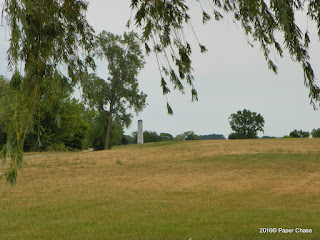Belle Isle is a 982-acre island park in the Detroit River, between
the United States mainland and Canada. Owned by the City of Detroit, it is managed
as a state park by the Michigan
Department of Natural Resources through a 30-year lease
initiated in 2013. Belle
Isle is the largest city-owned island park in the United States. It is connected
to mainland Detroit by the MacArthur Bridge. The park includes an Conservatory, James Scott Memorial
Fountain, William Livingstone Memorial Lighthouse, the Belle Isle Aquarium, the 1908 Belle Isle Casino building that is
not an actual gambling facility.
The Anna Scripps Whitcomb Conservatory is a botanical garden and greenhouse. It opened in 1904 and covers 13 acres. In 1953 it was named in honor of Anna Scripps Whitcomb, who left her 600-plant orchid collection to the city. Thanks to her gift and subsequent donations, the conservatory is now home to one of the largest municipally-owned orchid collections in the United States. Beautifully landscaped with perennial and annual gardens the conservatory building is over an acre. The central dome is 85 feet high and has a palm house in the dome. There are tropical plants of financial importance such as bananas, oranges, coffee and sugar cane. There are extensive collections of ferns, cacti and succulents also a continuous display of blooming plants.
Nancy Brown Peace Carillon is another site to see on the island. Brown was a favorite
writer for the Detroit News. In
1936, her readers proposed erecting a tower to commemorate the Sunrise Service
on Belle Isle that Brown had initiated in 1934.
Located on the east end of the island, the William
Livingstone Memorial Light is the only marble lighthouse in the United States.
The Scott Memorial Fountain is on the southern tip of
Belle Isle. Scott was left a sizable fortune by his father who
invested in Detroit real estate. According to contemporaries, Scott was a
scoundrel who gambled, womanized and told off-color stories. He was also vindictive and made many enemies.
Scott died in 1910 with no heirs or colleagues and he bequeathed his estate of $200,000 to the City of Detroit with the condition that the fountain include a life-sized statue of him.A debate ensue.
The cities community and religious leaders were against accepting the money
believing a person with the this kind of reputation should not be immortalized
in the city The cities political leaders wanted to accept the money believing
that the city shouldn't insult any of its people by refusing the offer. While
the debate raged,
Scott's fortune continued to grow and by the time
construction commenced it topped $1 million. The fountain was finished in 1925
and cost $500,000. The fountain is 510 feet across, and its central fountain
could spray water 125 feet into the air. It has 109 water outlets in the shape
of dolphins, turtles, lions and human figures. Around the bottom of the fountain, 16
separate reliefs depict life in the early days of Detroit on the James Scott
Memorial Fountain.
The back of
the statue says: “For the enjoyment of the people and for the adornment of his
native city. James Scott bequeathed to Detroit his fortune to be used in the
construction of this fountain. Erected MCMXXIII. From the good deed of one
comes benefit to many.”
Information from:
https://en.wikipedia.org/wiki/James_Scott_Memorial_Fountain
Next RV/MH Hall of
Fame



















